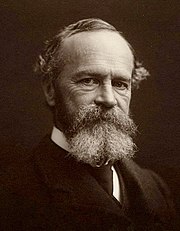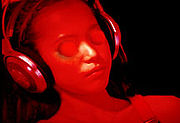
Back ما وراء علم النفس Arabic پاراپسيكولوجيا ARY Parasicoloxía AST Parapsixologiya Azerbaijani پاراپسیکولوژی AZB Парапсіхалогія Byelorussian Парапсихология Bulgarian পরামনোবিজ্ঞান Bengali/Bangla Parapsicologia Catalan پاراسایکۆلۆژی CKB



Parapsicologia é uma pseudociência[1][2][3] dedicada à investigação de supostos fenômenos paranormais e psíquicos. Seu propósito é a pesquisa científica de telepatia, precognição, retrocognição, clarividência, telecinesia, projeção da consciência, experiências de quase morte, reencarnação, mediunidade e outras reivindicações paranormais e sobrenaturais.[4][5][6][7]
O termo parapsicologia foi criado em 1889 por Max Dessoir[8][9] e adotado na década de 1930 por Joseph Banks Rhine[10] para substituir os termos "metapsíquica" e "pesquisa psíquica".[11]
A posição da parapsicologia como ciência é contestada e usada como exemplo de paradigma pseudocientífico.[12] Após mais de um século de investigações, não foram obtidos resultados suportados pelo método científico[13][14], mas pesquisas com meta-análise sugerem ainda campo a ser explorado[15][16][17]. A Parapsychological Association, criada em 1959, apesar das críticas, participa da Associação Americana para o Avanço da Ciência.[18][19][20]
- ↑ Gross, Paul R; Levitt, Norman; Lewis, Martin W (1996). The Flight from Science and Reason (em inglês). New York: New York Academy of Sciences. p. 565. ISBN 978-0801856761.
The overwhelming majority of scientists consider parapsychology, by whatever name, to be pseudoscience.
- ↑ Friedlander, Michael W (1998). At the Fringes of Science (em inglês). xxx: Westview Press. p. 119. ISBN 0-8133-2200-6.
Parapsychology has failed to gain general scientific acceptance even for its improved methods and claimed successes, and it is still treated with a lopsided ambivalence among the scientific community. Most scientists write it off as pseudoscience unworthy of their time.
- ↑ Pigliucci, Massimo; Boudry, Maarten (2013). Philosophy of Pseudoscience: Reconsidering the Demarcation Problem. [S.l.]: University Of Chicago Press. p. 158. ISBN 978-0-226-05196-3.
Many observers refer to the field as a 'pseudoscience'. When mainstream scientists say that the field of parapsychology is not scientific, they mean that no satisfying naturalistic cause-and-effect explanation for these supposed effects has yet been proposed and that the field's experiments cannot be consistently replicated.
- ↑ Parapsychology. Cambridge Dictionary. Página visitada em 27/11/2014.
- ↑ Harvey J. Irwin and Caroline Watt. An introduction to parapsychology, McFarland, 2007.
- ↑ What is parapsychology?. The Parapsychology Association (online). Página visitada em 22/06/2014.
- ↑ Alvarado, Carlos S. Reflections on Being a Parapsychologist. Journal of Parapsychology, vol. 67, pp. 211-248 (2003)
- ↑ Wolfgang G. Bringmann, Helmut E. Lück, Wolfgang G. Bringmann A pictorial history of psychology 1997, p. 71
- ↑ Sommer, Andreas (2013). «Normalizing the Supernormal: The Formation of the "Gesellschaft Für Psychologische Forschung" ("Society for Psychological Research"), c. 1886–1890». Journal of the History of the Behavioral Sciences (em inglês). 49 (1): 18–44. ISSN 1520-6696. PMID 23169462. doi:10.1002/jhbs.21577
- ↑ Rhine, J.B (1973). Extra-sensory Perception (em inglês). Boston: Branden Books. p. 240. ISBN 9780828314640. Consultado em 4 de Maio de 2016.
About this book, from the author in 1964. This is the book that started all the hullabaloo that for more than twenty-five years has been going on around the world over the subject of ESP, or extrasensory perception, and related topics. Its publication in 1934 started the movement that has brought parapsychology in to the university laboratories in various countries and is leading to its acceptance as a proper branch of science, slow and irregular tough this later development is in some countries specially
- ↑
 Chisholm, Hugh, ed. (1911). «Psychical research». Encyclopædia Britannica (em inglês) 11.ª ed. Encyclopædia Britannica, Inc. (atualmente em domínio público)
Chisholm, Hugh, ed. (1911). «Psychical research». Encyclopædia Britannica (em inglês) 11.ª ed. Encyclopædia Britannica, Inc. (atualmente em domínio público)
- ↑ Bunge, Mario (1983). Treatise on Basic Philosophy: Volume 6: Epistemology & Methodology II: Understanding the World (em inglês). Dordrecht: Springer Science & Business Media. pp. 223–228. ISBN 9789027716347.
In conclusion, parapsychology is a pseudoscience paragon.
- ↑ Hyman, R. (1986). «Parapsychological research: A tutorial review and critical appraisal». Proceedings of the IEEE. 74 (6): 823–849. ISSN 0018-9219. doi:10.1109/proc.1986.13557
- ↑
- Daisie Radner; Michael Radner (1982). Science and Unreason. Belmont: Wadsworth. pp. 38–66. ISBN 0-534-01153-5
- Mario Bunge. (1987). Why Parapsychology Cannot Become a Science. Behavioral and Brain Sciences 10: 576-577.
- Terence Hines. (2003). Pseudoscience and the Paranormal. Prometheus Books. pp. 113-150. ISBN 1-57392-979-4
- Pigliucci, Massimo; Boudry, Maarten (eds.) (2013). «Goode, Erich. Paranormalism and Pseudoscience as Deviance». Philosophy of pseudoscience: reconsidering the demarcation problem (em inglês). Many observers refer to the field as a "pseudoscience". When mainstream scientists say that the field of parapsychology is not scientific, they mean that no satisfying naturalistic cause-and-effect explanation for these supposed effects has yet been proposed and that the field's experiments cannot be consistently replicated. Chicago: The University of Chicago Press. pp. 145–163. ISBN 978-0-226-05182-6
- ↑ Utts, Jessica (1991). «Replication and Meta-Analysis in Parapsychology». Statistical Science (em inglês). 6 (4): 363–378. ISSN 0883-4237. doi:10.1214/ss/1177011577
- ↑ Storm, Lance; Tressoldi, Patrizio E.; Di Risio, Lorenzo (2010). «Meta-analysis of free-response studies, 1992–2008: Assessing the noise reduction model in parapsychology.». Psychological Bulletin (em inglês). 136 (4): 471–485. ISSN 1939-1455. doi:10.1037/a0019457
- ↑ Rao, K. Ramakrishna (15 de março de 2016). Basic Research in Parapsychology, 2d ed. (em inglês). [S.l.]: McFarland. ISBN 9781476626307
- ↑ Melton, J. G. (1996). Parapsychological Association. In Encyclopedia of Occultism & Parapsychology. [S.l.]: Thomson Gale. ISBN 978-0-8103-9487-2
- ↑ American Association for the Advancement of Science - Affiliates. Página visitada em 22/11/2014.
- ↑ University of Virginia - The Division of Perceptual Studies - Careers in Parapsychology/Psychical Research. Página visitada em 22/11/2014.
